|
Happy New Year! This title may be a little off since I am not one to set resolutions per say... but I had a new idea about incorporating habits in your life and making them stick. One of my best discoveries of 2020 was the Libby app that connects your library card to tons of free library content including audio books. A friend recommended The Little Book of Hygge. My mom has been into all things Northern Europe and hygge for a while but my official introduction to this was this book. For those who don't know, per the Cambridge Dictionary, hygge is "a Danish word for a quality of cosiness (=feeling warm, comfortable, and safe) that comes from doing simple things such as lighting candles, baking, or spending time at home with your family." The Danes consistently win the country that tops happiness per capita in the world. The author of the book is a leader from the Happiness Research Institute in Denmark and attributes the cultural inclusion of hygge in part for the wide spread happiness; In addition to all its population not having to suffer extreme unhappiness due to not having their basic needs met. How does hygge help with creating healthy habits? I got to thinking about the time I needed to study for my exam to be licensed as a Clinical Social Worker. I am a procrastinator and need to work to make myself do anything that I don't enjoy, unlike my husband who has the self-control to do all kinds of healthy things. Every time I studied for that test I lit a candle I had just gotten as a gift and made myself some tea. That candle has been burnt out for some time, but that scent still reminds me of studying. I made the task special by including my senses and making it a cozy experience. Including other elements of hygge like social connection, nature, a special indulgence, mindfulness of the moment, and setting a cozy mood would be great for any number of habits. For example, including friends on an exercising goal for connection and making fun memories. If reading more books is your resolution, making a cozy corner and a buying a special reading tea would be very hygge. If the Danes are on to something this practice could also boost your happiness! For years praying has been something I've struggled to make a habit in the way I would like. This weekend I decided to try and make prayer more hygge. I took some candles and went into our woods and sat quietly to pray and meditate. I am a person who needs lots of silence in my life but I rarely get it, especially since becoming a mom this year. This fifteen to twenty minutes of nature and quiet did me a lot of good. Though I may not do this every weekend I like the idea of making my prayer more mindful, sensory, and special. Why not make the things you struggle to do more enjoyable?
Do you have any habits you want to cultivate this new year?
2 Comments
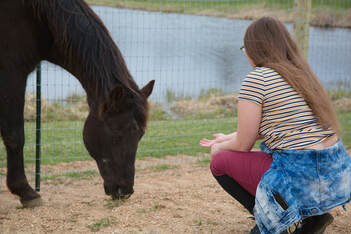 I sent out an email to a provider recently describing how the process of Equine-Assisted Psychotherapy can look with kids and teens to treat trauma and attachment. I thought it would make a good mini-blog post for others interested! In sessions the clients choose a horse to work with to form a real relationship with. We have three very different personalities in the herd to choose from and we will be adding a new friend next year as well! While the client is forming a relationship with their horse partner, they come up against patterns. These patterns are difficulties that they have in human relationships too, such as control, dysregulation, communication, and everything else you can imagine. The client is able to work on changing those patterns in the moment with a very attuned and sensitive being that understands our emotional energy. See more about “Why horses?” in the FAQ. That can look many different ways depending on the child, such as lacking confidence in making requests of another and thus using control or shutting down. We would then work on ways of staying regulated when triggered and being mindful of connection with the horse. Central to the relationship building are the attachment skills of giving care, receiving care, being an autonomous self, and negotiating needs from Jude Cassidy in the article, “Truth, lies, and intimacy: An attachment perspective.” How a child deals with those skills in human relationships will show up in sessions with the horse. Even more basic is that the horses allow the opportunity to practice coping with stress and dysregulation in the moment since they will not engage unless the client is at a stable energy. Everything in EAP is very experiential and thus building brain connections that can be used in their human relationships. There is also the possibility of mounted work to build brain connections for regulation using the horse's bilateral movements and brain exercises. Mounted work can also be integrated when the client has built a connect relationship and is ready to process trauma.
I hope this gives more of an explanation as to how horses can help children and teens with attachment and trauma therapy. If you think your child would be a good fit for this kind of healing, please give me a call to chat about it! 715-200-3838 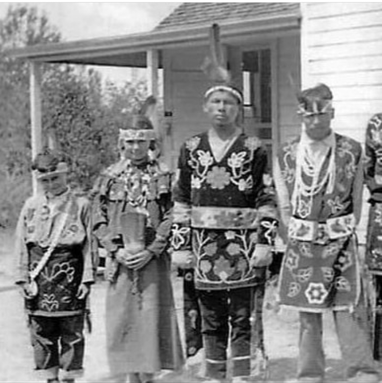 It is important for me to acknowledge Indigenous Peoples' Day. Not only because of it’s social justice relevance or value to the foster and adoption community whom I serve, since Native children are the most over represented in foster care (Adoption and Foster Care Analysis Reporting System, 2013), though these are vital issues. This is personally important as well, my mother is a Potawatomi Native American tribal member and I am a descendant. This day is important to be because of the deep connection I have always felt to these roots. The littlest guy in the photo above was my grandpa. So cute... 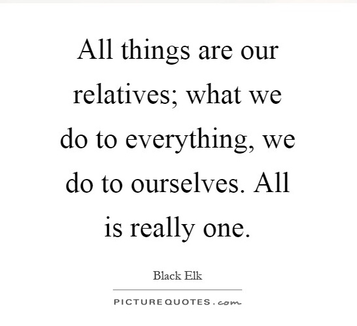 Many Native American values are a part of who I am. One of them is summed in this quote attributed to Black Elk. We as people and living things on this planet are not independent of one another. We have a responsibility to live harmoniously because we are all connected. This quote also brings to mind being interconnected. Interconnectedness is something I have been pondering since it was revealed as the focus for the Natural Lifemanship conference that will be next week. (Super excited for it by the way!) Being in a global health crisis also makes one consider the way we are all connected as well. There is so much research, particularly from Dr. Siegal, about how humans impact one another. This is called Interpersonal Neurobiology. Siegal states that humans are a product of the interactions we have with one another. Our brains and bodies are connected to the inner experiences of others as they connect with us. His “Triangle of Well-being" concept states that the mind, brain/body neural system, and relationships are all three working and changing as it shapes who we are. This starts in-utero and all our lives. Babies develop through the attachment relationship and their mind, brains, and bodies are organized (or disorganized).
Even cooler for human interconnectedness is the research on epigenetics that has shown us that our bodies and brains that are developing by these experiences code our DNA and is passed on to our children. Unfortunately, trauma that changes the brain and body of the individual can be passed through our DNA to the next generations and predispose them to stress-related difficulties. This brings me back to Indigenous Peoples’ Day. This day marks a shift to acknowledge the injustices done to Native people. Injustices that caused trauma and has impacted current barriers in communities and likely epigenetics. As a person who was shaped by my Native family relationships, I believe that resilience, love of nature, and the visceral feeling of awe when I hear drumming also impacts me. On Indigenous Peoples’ Day, seek out Native voices to understand the history and impacts of today, but also the wisdom and understanding of a people that that knew interconnectedness even before neurobiology explained it. Resources: Natural Lifemanship Conference: https://naturallifemanship.com/interconnected-2020-registration Interpersonal Neurobiology: https://www.drdansiegel.com/ https://therapistuncensored.com/episodes/tu15-decoding-the-science-of-interpersonal-neurobiology/ Epigenetics https://www.psychologytoday.com/us/blog/psyched/201909/the-epigenetics-childhood-trauma-0 Indigenous Peoples' Day: https://www.localpassportfamily.com/2020/10/indigenous-peoples-day-resources-for-families.html https://www.smithsonianmag.com/blogs/national-museum-american-indian/2020/10/07/indigenous-peoples-day-2020/ 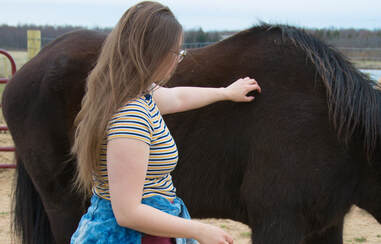 Thanks for stopping by! I hope to shed some light on how therapy with horses can be a really helpful way to treat trauma for kids. It isn't just "playing with horses" or a healing hobby for your child. It is real therapy and really effective! If you took a look at my blog post from last week you got a glimpse of how equine-assisted psychotherapy helped me grow personally. This blog post is for those wondering how this process can help your child who has gone through trauma. Since my specialty is foster care and adoption, though I do work with other trauma as well, you might be a mama reading this who has a child in their home that you aren't sure if their struggles are related to adoption or "just being a kid." All children who have joined a family though adoption have been traumatized. Even if they were placed in your arms at the hospital. There is trauma that occurs in utero and at birth. Not only possible exposure to substances, but even those moms who have chosen adoption from the start have to undergo the stress of that decision which the baby takes in as well. Then factor in losing the only connection you have had for nine months with no way to process it verbally. Memories we have as a baby stay with us in our bodies. Pre-verbal trauma can often be harder to deal with because it had set up the way your brain and body work from there out with no way to explain it to yourself when you are triggered. On top of that early trauma, many of our children also come home to us with abuse and neglect. All trauma can deeply impact a child’s brain, body, behaviors, biology, and beliefs about themselves and the world.* 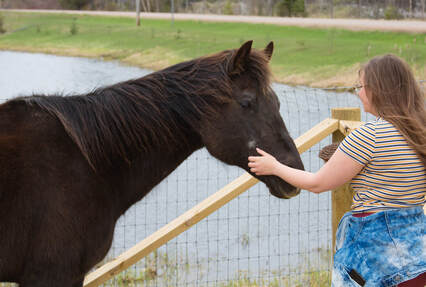 Do any of these scenarios sound familiar? A child who can go from happy to throwing chairs without any notice. A teen who can’t seem to make or keep friends. A child who seems to reject your love and makes it hard for you to like them most days. These are all impacts of trauma! The Early Child Mental Health Consultation has laid out the trauma signs and symptoms for infants and young children really well in this article. Also see the image below for other signs that your child or teen is struggle with their trauma history. 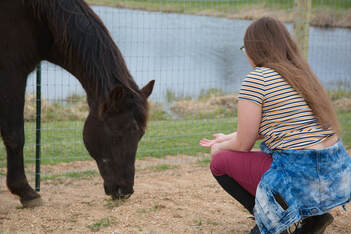 Having a child in your home with any of these symptoms is extremely challenging. A parent needs all the help they can get! Equine-assisted psychotherapy may be just the thing your child needs to work through their history and replace trauma behaviors with connection. It is experiential so it will get to the body-stored trauma. Connecting with a horse can often be easier for a child with relationship trauma as well so there is often more engagement. Not to mention the horse can walk away when our kiddos are not regulated leaving them to realize how their behavior impacts others. What would the benefits of treatment with horses look like for child and teen with trauma?
If you have any questions about your child and how Wholehearted Herd Counseling can help give me a call! 715-200-3838 Wholehearted Herd Counseling, LLC provides trauma therapy for children and teens and family therapy focused on attachment for adoptive and foster families with the help of horses. Wholehearted Herd Counseling, LLC is an equine-assisted therapy service in the central Wisconsin, Wausau, and Antigo areas. * https://child.tcu.edu/about-us/tbri/#sthash.E6PUSFgK.mG8E8tyv.dpbs Image “Impact of Childhood Trauma”: https://www.theedadvocate.org/the-impact-of-childhood-trauma/ I thought I would share a little bit about the model of equine-assisted therapy I choose to use in my practice and my own experience of it working for me. It is called Trauma-Focused Equine Assisted Psychotherapy from the Natural Lifemanship Institute. It’s hands on, attachment-based, and powerful! I discovered Natural Lifemanship (NL) through a search of a different horse therapy models. The ones I knew about were based on metaphor work and little contact with the horses. I myself struggle with understanding abstract things sometimes and I know kids need more playing and doing than talking... so, I was looking for something different. I was already doing in-home family therapy and NL seemed to be the TBRI (Trust-Based relational Intervention) of horse therapies. It is about relationships, attachment, and trauma where you actually get to be with the horses. I jumped right in and signed up for a training! I wanted to see if this was something I could see myself doing and if one day I could meld my passions of therapy and horses as my own business. 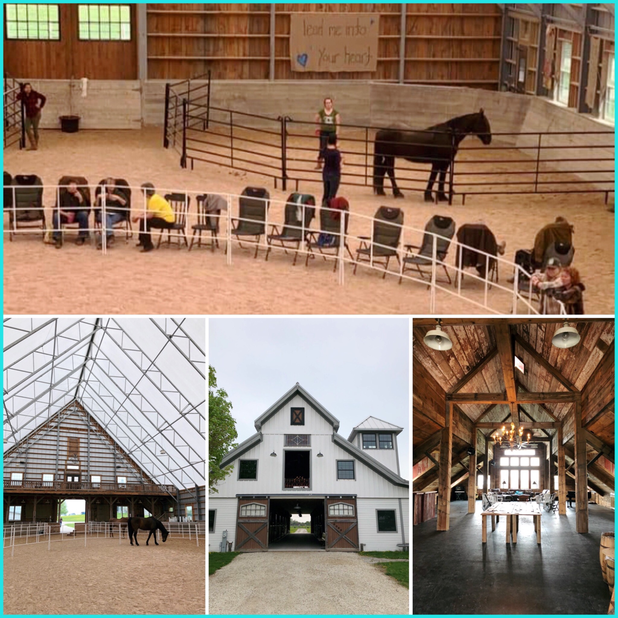 First off, the training host site at Soulful Prairies in Woodstock IL was an absolute dream (see the included pictures). I was drooling and daring to let myself dream of my own business plans. This made me even more excited to see what this work was about and how it would fit in my dreams. As I sat in sessions learning at the training, I was slightly skeptical of how all this would come together working with the horses. The model is building real relationships with horses and thus rewiring the brain impacted by trauma and attachment wounds. It sounded too fun to get at the deep emotional stuff a client has. It was then our turn in the training to get a taste of the work and do it with the horses. I stepped into the round pen very nervous but I was thrilled that the horse I picked connected with me and even followed me right away! After the first day I went back to my hotel and told my husband that I was really good at this! (I did say that much to my embarrassment now). Little did I know the next day I would learn just how this model get at your own “stuff.” I walked into the round pen the next day and nothing was working. Every attempt to get the horse to come to me was ignored or resisted. I felt tears well up in my eyes as I thought that I was not in fact cut out for this. The trainer caught scent of my near-tears, as any therapist has a sixth sense for (see the top photo for proof). I was trying to hide my emotional "issue" and much to my annoyance she asked me what was going on in my relationship with the horse. I said “he isn’t letting me be good at this!” Then it dawned on me that I wasn’t in the round pen working on the relationship with the horse as I was supposed to, I was trying to be perfect so I could prove to myself I was good enough to do this as my career. Well then the tears came more... the trainers were amazing and helped me though this. When I turned around after wiping my tears to try again to actually connect with the horse... he was already there! I went to the training wondering if I would be “good” enough to do this. Should I start this business? Am I good enough for this dream? Perfectionism and the quest of being “good enough” has been a life long struggle for me and the horses brought that out! It was the exact thing I needed to deal with in order to feel confident that no matter what difficulty comes my way I can rest in the fact that this isn’t about me being “good enough.” Relationships are work and hard. If I show up, be myself, do the work I am good enough. I also had the realization that whatever I am lacking Jesus promises to be there with me to use my weaknesses to make things perfect. I can’t be perfect on my own. Hopefully you can understand a little glimpse of how this kind of therapy can work. Maybe you just needed to hear that you are good enough too. This parenting journey of foster care and adoption is no easy task. There is surely no perfect way to do it besides showing up, being yourself, and doing the work. If you don’t know where to start, the horses and I are waiting to help! Call or email me to set up an appointment! 715-200-3838 | [email protected] Wholehearted Herd Counseling, LLC provides trauma therapy for children and teens and family therapy focused on attachment for adoptive and foster families with the help of horses. Wholehearted Herd Counseling, LLC is an equine-assisted therapy service in the central Wisconsin, Wausau, and Antigo areas. 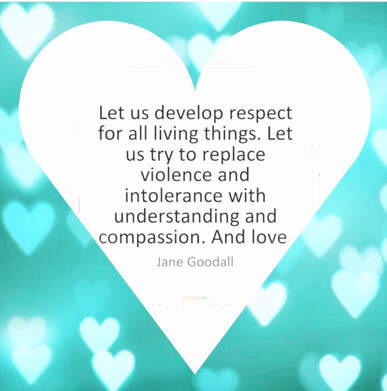 Hello again! I shared this quote by Jane Goodall on the Instagram page to highlight the value we have at Wholehearted Herd Counseling of respecting all living things. This shows up in how we value the horses as equal participants who can communicate their desires and needs to us. We value all people as precious individuals created in God's image. We do our best to make choices that care for the Earth. We see the worth of extending dignity to all creation as best we can. We also believe that we should treat ourselves with loving regard, connection, and care. I don't do this perfectly. But I feel so much better when I try. 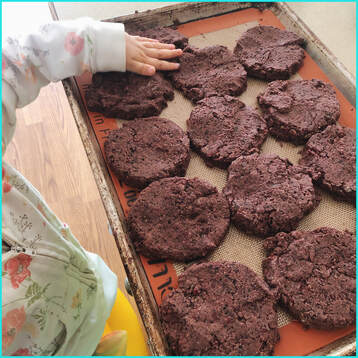 I would like to share one of my favorite recipes that cares for our bodies, the environment, and our animal friends. It's one that our two year old loves to help make too! Veggie Burgers! She gets to form her own personal patty "all by myself" that she is proud to eat. 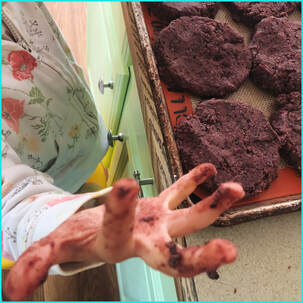 Beet Bean Burger Recipe (Vegan and gluten free) Ingredients: 1 15oz can of beets 4 cups of black beans 1 medium onion chopped 1 TBS chopped garlic Olive oil 3/4 cup masa corn flour 2TBS ground flax seed 1 tsp smoked paprika 2 tsp cumin 2 tsp garlic powder 2 TBS soy sauce 2 TBS Worcestershire sauce (use vegan if desired) Handful of dark leafy greens (optional) Directions: Preheat the oven to 400 degrees. Sauté the onion and garlic with oil in a pan. When they are done to your liking (I like the caramelized flavor) add them and the rest of the ingredients to a food processor and blend until incorporated. Form them into patties and bake for around 30-40 minutes until pretty firm to the touch. Let set for 5-10 minutes before serving to firm a little more. I like to freeze these when cooled between wax paper to have ready when needed! Makes 13 medium patties. Wholehearted Herd Counseling, LLC provides trauma therapy for children and teens and family therapy focused on attachment for adoptive and foster families with the help of horses. Wholehearted Herd Counseling, LLC is an equine-assisted therapy service in the central Wisconsin, Wausau, and Antigo areas. 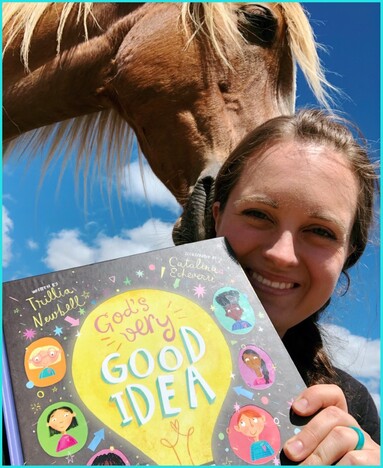 The book I chose to share today on my Instagram gives me hope that the way the world is today was not God’s plan. God will make things right and new again. God’s plan was for us to love each other, celebrate and embrace our differences the way He created them, and love Him. My heart is grieved, angry, overwhelmed… The deaths of George Floyd and Ahmaud Arbery have been heavy on my heart. I am grieved for the mamas who lost their sons. I am angry that people are more upset with looting than with the injustice. I am worried for White adoptive and foster families who are raising Black babies that may not be sensitive to these topics living in a world that will seek to tear those babies down.. I am tired of keeping my heart open. Does opening your heart to all the world’s grief make your heart less whole? I would argue that if you don’t have an open heart you can’t be wholehearted. We can’t numb ourselves to the pain of the world and hope that we can be joyful and fulfilled people. As Brené Brown states this fact so wonderfully: “You can't numb those hard feelings without numbing the other affects, our emotions. You cannot selectively numb. So when we numb those, we numb joy, we numb gratitude, we numb happiness. And then we are miserable, and we are looking for purpose and meaning, and then we feel vulnerable, so then we have a couple of beers and a banana nut muffin. And it becomes this dangerous cycle.” Brené Brown, The Power of Vulnerability: Teachings of Authenticity, Connections and Courage I have to keep listening to Black voices and their pain and seeking to do better. No matter how tempting it is to numb it. It hurts but it is part of White privilege to be able to ignore it and it needs to stop. The point isn’t to consume our lives with tragedy but to challenge complacency and the silence that breeds this injustice. Our kids need to hear our grief over this. They need to hear hard conversations about race and Black history in America. It’s our job to raise children that are able to recognize and stand up to racism. 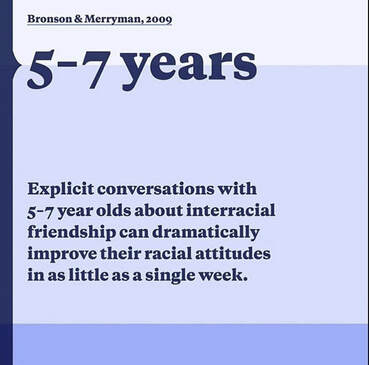 Some things giving me hope about this are from the Conscious Kids platform. They are a great resource on how to follow for support on doing this well. The picture statistic is from their Instagram page. One week of tough conversations can change our kid’s racial attitudes! That’s amazing. Today’s Parent also has a great article about how to talk to your children about racism by age. https://www.google.com/amp/s/www.todaysparent.com/family/parenting/how-to-talk-to-kids-about-racism-an-age-by-age-guide/amp/ One of my favorite people doing transracial adoption so well is Rachel from White Sugar, Brown Sugar. She’s a great person to follow to example how to intentionally pour validation into your Black and Brown children. In a world filled with hate your life and home needs to be building them up at every chance you can get. If you have other parenting resources share them below! Wholehearted Herd Counseling, LLC provides trauma therapy for children and teens and family therapy focused on attachment for adoptive and foster families with the help of horses. Wholehearted Herd Counseling, LLC is an equine-assisted therapy service in the central Wisconsin, Wausau, and Antigo areas. 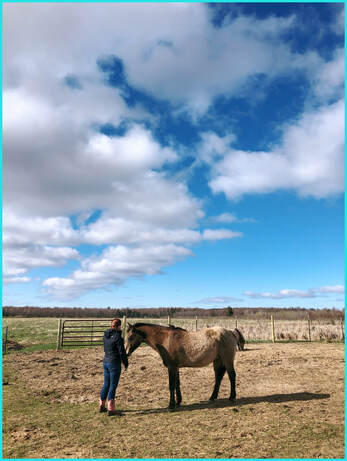 Reunification is a word every foster family knows. It is the goal of foster care to bring biological families back together, or reunify, if possible. This happened at our ranch last week. My sister recently moved to the country and worked to put up fences this year to take her horse, Peppy, home. We had been “fostering” Peppy and planned to for as long as she needed. In my mind I thought of the wonderful therapeutic work that could be done with the families I choose to serve, foster and adoptive families, when Peppy returned home. It could help my future clients to work through their issues with grief, loss, and attachment when separated. Well I was wrong and it turns out maybe I was the one who needs the lesson? I am a foster parent on this journey as well trying to balance loving someone fully yet knowing they will leave. This foster care experience really throws this lesson at you but really all parents (and people) have to balance this very same thing eventually. We don’t know how many days we have to love a child, parent, friend... or horse. We have to fully and wholeheartedly love who we have in front of us knowing that we will lose them someday. 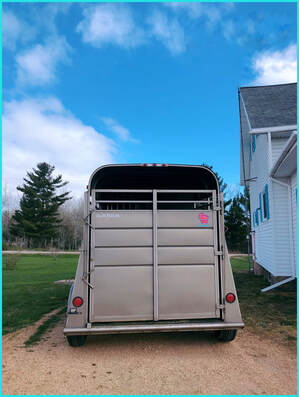 This is actually a skill of healthy attachment. Attachment isn’t just being right with someone all the time. You aren’t fully attached if you can’t feel safe being apart. In my training through Natural Lifemanship, the model of therapy we use at Wholehearted Herd Counseling, this is called connection through detachment. If you think about it this makes sense that you don’t have a healthy and secure attachment if you can’t be apart and trust that the other person won’t do something to hurt you or never return. We develop this as young children as we venture farther from them and return to their loving embrace. We learn to feel safe doing both. Our kiddos from hard places can have issues with this and it can show up like fear at bedtime, going to school, or even being in a room without you. They did not get a chance to develop that attachment dance that wires our brain for connection and mental health. This is part of the restorative work we can do as foster parents! This is why we need to have earned secure attachment for ourselves because we can't give what we don't have. In my experience as a therapist the way that a parent has come to terms with their own attachment and history can have the biggest impact on their children. 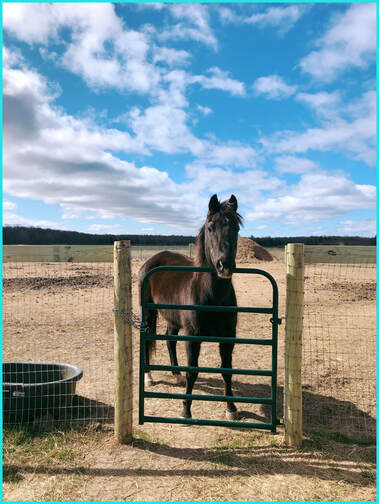 How can this principal of being attached when apart apply to reunification in foster care? In ideal situations birth parents could allow phone calls, visits, and letters from former foster parents. We also help the children in our care learn the skills of connection through detachment by encouraging visits, conversations, and having pictures of their birth family in the home while we have them. When they return home they will have been connected to them and will have learned the skills of connection when apart from people they love. We can feel connected when apart by thinking about the next visit or writing them what is happening at home. I definitely will plan to visit Peppy at my sister’s home. Our foster daughter also had the idea of video chatting him which we did this past weekend. When Peppy heard our voices he went to look for us! It brought up sad and happy emotions for me. Peppy was also maintaining the connection in his heart too! Unfortunately for Peppy’s long-term friend Jack (pictured at the gate) he is not able to see him again and said his “goodbyes” to the trailer as it pulled away. That was equally sad to see. As nice as phone calls and visits are, we aren’t always promised the ability to have contact with our former foster kiddos who return, like Jack and Peppy. That doesn’t mean we can’t have connection. Connection is very much a internal sense. That is why this model of therapy working with the horses is so powerful. You and your child can develop a felt sense for what connection is in your own body. Thoughts, memories, and prayers connect us as well. I won’t pretend that detachment is easy for me either. I struggle to stay connected when I am apart. I can tell you that my own personal work with the horses has helped me since learning and doing this therapy work. When working with the horses you get to practice the attachment dance and work on where it may have went wrong for you to learn a new way. This leads to happier relationships, deeper connections, and more wholehearted families. Email for more information or to try it out for yourself! [email protected] Wholehearted Herd Counseling, LLC provides trauma therapy for children and teens and family therapy focused on attachment for adoptive and foster families with the help of horses. Wholehearted Herd Counseling, LLC is an equine-assisted therapy service in the central Wisconsin, Wausau, and Antigo areas. 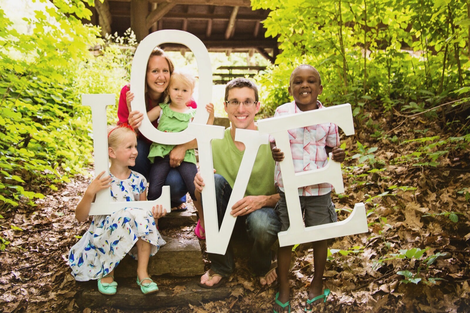 To the adoptive or foster mother on Mother’s Day, Loving a child that was born to another mom daily challenges us to hold differing emotions. I’m convinced no other experience lets a person feel what “bittersweet” really means. We feel the joys of each sweet smile and laugh, yet know the hurt that also comes with the brokenness of adoption. Mother’s Day is no different. However, just because something comes from brokenness doesn’t mean that it isn’t worth noting the powerful way that you have the privilege of being in relationship with your child. Caring for boo boos, sitting outside the room of a crying teenager, watching them open the door for an elderly woman at the store, making their sister laugh, and just those genuine moments that no one other than a “real” mom can have the privilege of enjoying. You are a real mom. So is their biological mom. Mother’s day is for all. I have some ideas about how to make mother’s day special (or at the very least lessen the stress) as an adoptive or foster mom.
Wholehearted Herd Counseling is also here for you and your family. I get this on a personal and professional level and I am here. You may ask how can working with a horse in therapy help me with parenting my child? The Natural Lifemanship model of therapy we utilize helps you to work on your own attachment and ways of being with the horse in real time. This is also helpful for your children to learn relationship skills and feel what works and doesn’t in their own bodies. The focus on neurobiology and integrating your brain also will expand your ability to hold the bittersweet emotions and not be triggered. Don’t hesitate to send me email for more information or to try it out for yourself. [email protected] Wholehearted Herd Counseling, LLC provides trauma therapy for children and teens and family therapy focused on attachment for adoptive and foster families with the help of horses. Wholehearted Herd Counseling, LLC is an equine-assisted therapy service in the central Wisconsin, Wausau, and Antigo areas. |
Proudly powered by Weebly
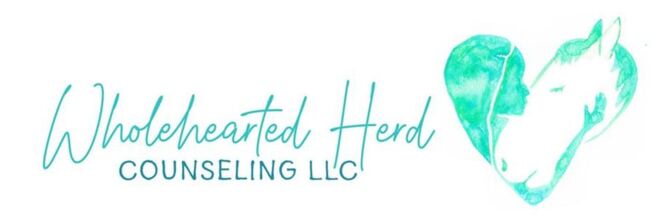
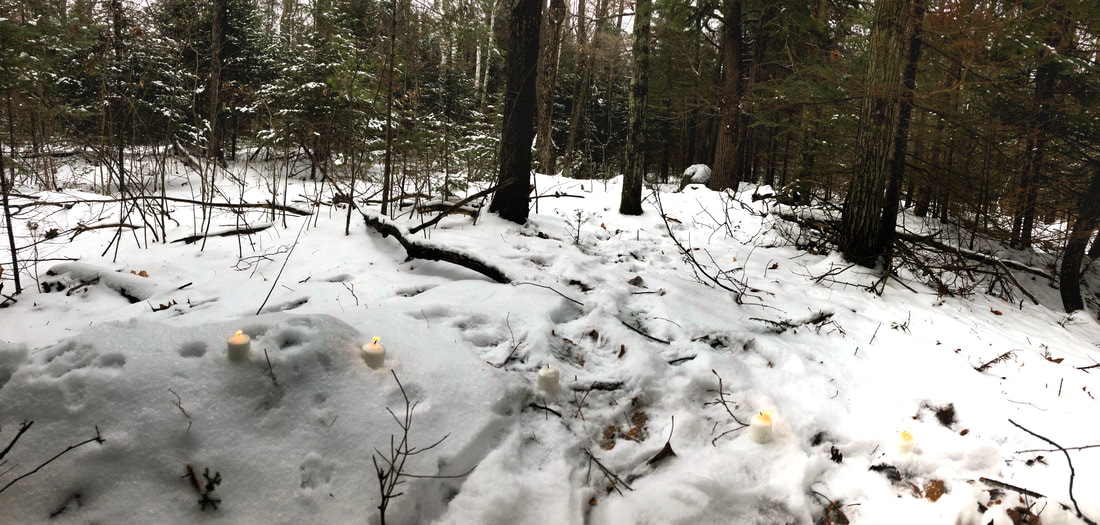
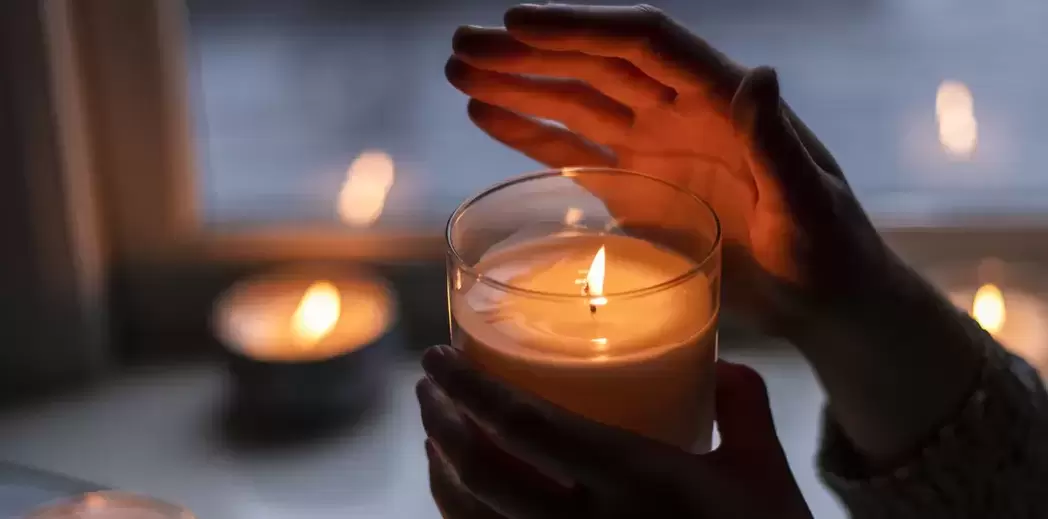
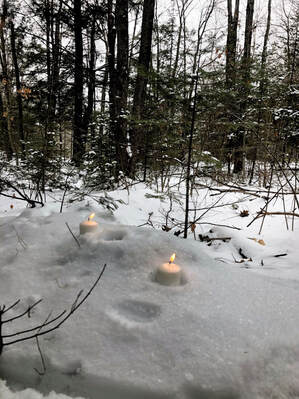
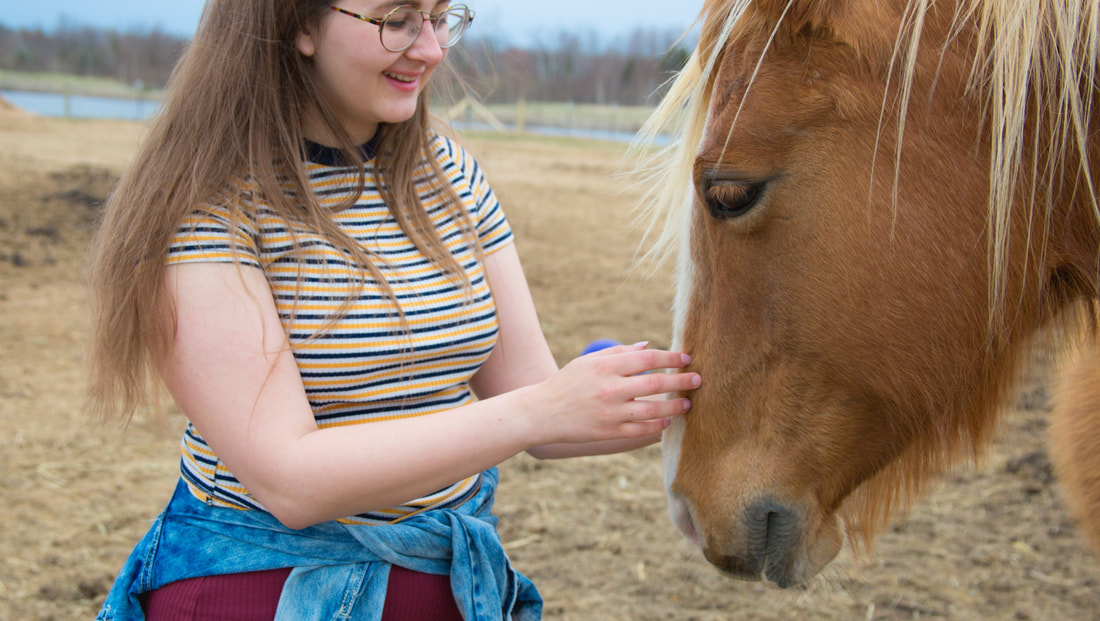
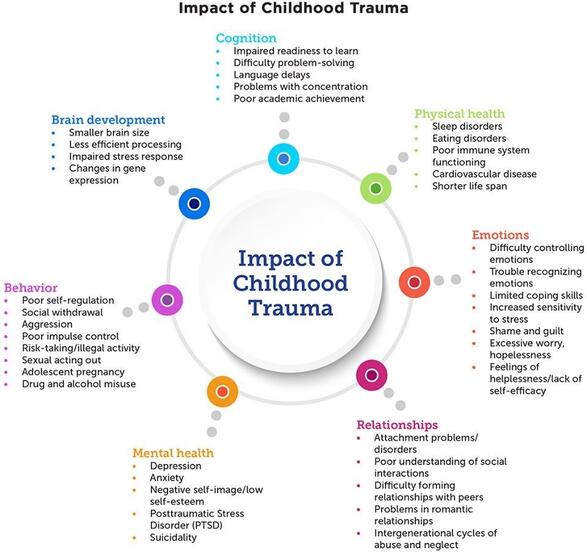
 RSS Feed
RSS Feed